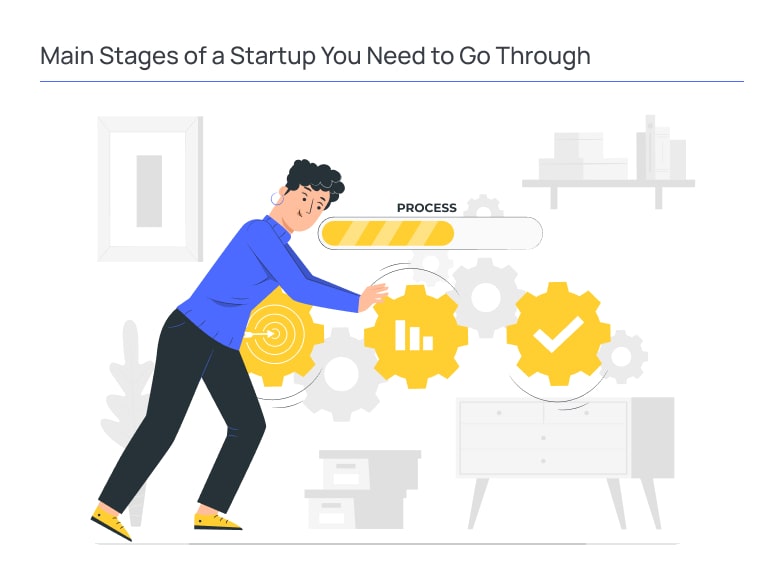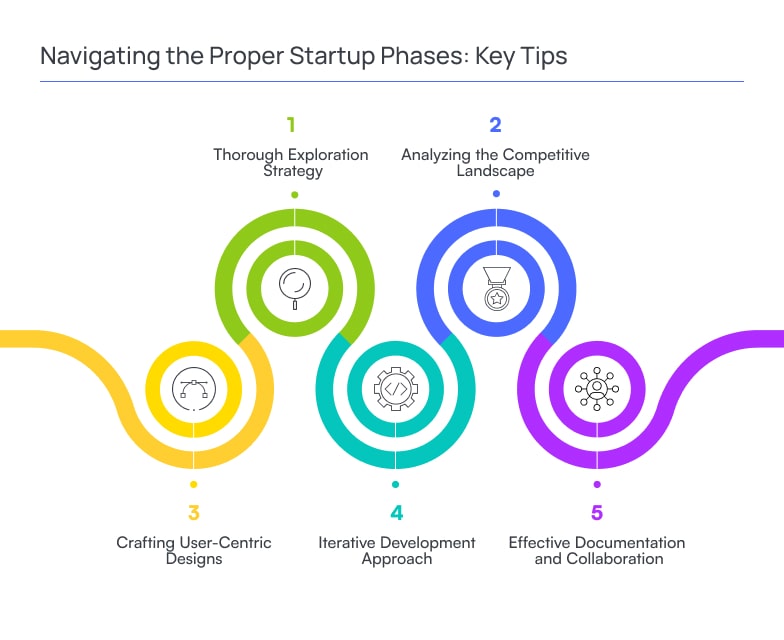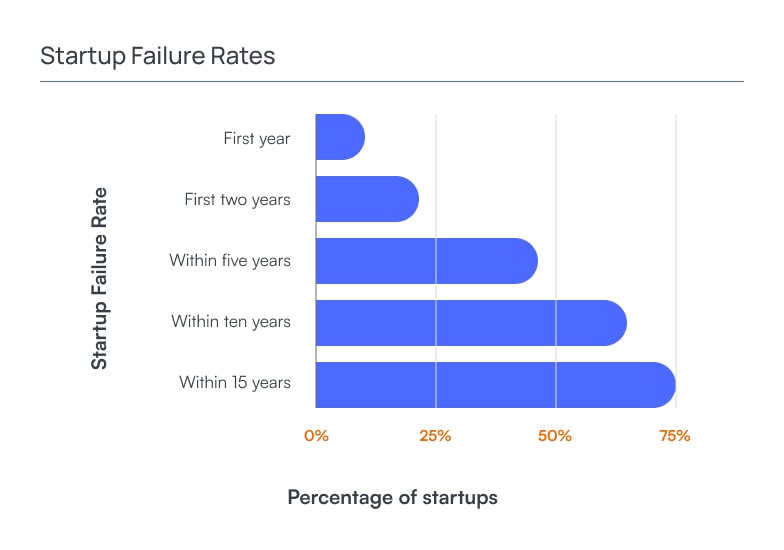The article delves into the nuanced progression of a startup’s growth, exploring the key phases essential for its evolution and sustainability. Spanning from the idea to the establishment, the startup stages of growth represent a dynamic process, starting with developing an idea and gradually transforming it into an actual entity poised for market entry and expansion.
From the initial stages, where ideas are refined and tested for market viability, to the critical phases of market entry, growth, and scaling operations, each stage presents unique hurdles, learnings, and opportunities.
This guide serves as a compass for entrepreneurs, providing valuable insights, strategies, and actionable steps tailored to each distinct phase. Whether it’s acquiring initial funding, building a prototype, or crafting a scalable business model, understanding and effectively navigating these stages of startup creation is imperative for aspiring entrepreneurs to chart a path towards success and sustainable growth.
What Is a Startup Company?
A startup company is a business in its early stages of development that aims to create a unique product or service to meet a certain market demand. It’s characterized by its goal of growth and scalability, often operating in a state of uncertainty with limited resources. Typically, startups are born from a novel idea or solution to address a specific problem or need within society or a particular industry.

Some distinctive traits of a startup company are:
- Focused on growth: Startups are typically focused on rapid growth and scaling, often using technology to achieve their goals.
- Innovative: Startups are often founded on innovative ideas that aim to disrupt existing markets or create new ones.
- Risk-taking: Startups are willing to take risks and experiment with new ideas, often with limited resources.
- Flexible: Startups are adaptable and flexible, able to pivot their business model or strategy as needed.
- Small team: Startups are usually started by a small team of founders who are passionate about their idea and willing to work hard to make it a reality.

Main Stages of a Startup You Need to Go Through
From the inception of an idea to achieving sustainable growth, the entrepreneurial voyage encompasses seven distinct phases that are indispensable and interdependent. Each stage serves as a stepping stone, presenting opportunities for learning, adaptation, and strategic maneuvering. Ignoring or rushing through any of the startup stages risks undermining critical insights, hindering crucial decisions, and impeding overall progress. Therefore, understanding, navigating, and mastering each of these phases is pivotal, ensuring a comprehensive and resilient approach to achieving sustainable growth and long-term success for any startup.
Crystallizing the idea: Ideation Stage
The Ideation Stage marks the genesis of a startup, where raw ideas are nurtured and shaped into viable concepts. It involves brainstorming, researching market needs, and conceptualizing solutions. This stage is crucial as it sets the foundation for the entire venture, determining its direction, uniqueness, and potential success. Thoroughly navigating this startup growth stage ensures a clear understanding of market demands, identifies gaps, and lays the groundwork for innovative solutions. Failing to delve deeply into the ideation process might result in inadequate market fit or ineffective solutions. Thus, a robust Ideation Stage is integral for a startup to craft a compelling vision and a solid foundation for future growth.
Pre-Seed Phase
In this stage, entrepreneurs begin formalizing their ideas into a tangible plan. This phase involves validating concepts, conducting preliminary market research, and possibly creating a prototype or a proof of concept. It’s characterized by exploring the feasibility of the idea, identifying the target audience, and understanding potential challenges and opportunities.
During the Pre-Seed Phase, founders may invest personal funds or seek help from friends and family to validate their concept. The focus here is to refine the business idea, gather initial feedback, and prepare for more formal funding rounds in the future.
This phase is crucial as it sets the groundwork for the Seed Stage and subsequent rounds of funding. Entrepreneurs use this phase to refine their ideas, test assumptions, and gather sufficient evidence to attract investors in the following stages of growth. It’s an essential stepping stone that helps shape a clearer direction for the startup and lays the groundwork for the subsequent stages of development.
Seed Phase
The Seed Phase marks a pivotal point in a startup’s growth journey. During this stage, companies secure initial funding to develop and refine their product or service. Its significance lies in laying the groundwork for market entry and building a customer base. Startups allocate these funds strategically, often focusing on product development and market research to better understand customer needs. Establishing a viable product-market fit and gaining early adopters are fundamental in this phase, as they set the stage for further growth and customer acquisition strategies in subsequent stages.
Early Stage
During the Early Stage, a startup has already moved past the initial phases and begun to lay a solid foundation for growth. Unlike the earlier stages focusing on conceptualization, fundraising, and gaining initial traction, the Early Stage is where the real work and execution start. Here, entrepreneurs transition into the development and scaling of their product or service. It’s a pivotal moment marked by intensive product refinement, market testing, and establishing a more defined customer base. This phase demands meticulous attention to detail, agility, and adaptability to navigate the challenges that arise while striving for sustainable growth. Successful navigation through this phase is crucial for the startup’s viability and long-term success, setting the stage for the next phases of expansion and evolution.

Growth Stage
The Growth Stage represents a pivotal phase in a product or business lifecycle. During this period, there’s a substantial increase in customer adoption and revenue. Companies at this stage typically focus on scaling operations, expanding their customer base, and refining their products or services based on market feedback. Strategies revolve around maximizing market share, refining marketing tactics, optimizing processes, and often seeking additional funding for further expansion. Challenges may include managing rapid growth, maintaining product quality, and establishing a sustainable business model. Success during the Growth Stage often sets the foundation for long-term sustainability and profitability.

Expansion Stage
The Expansion Stage denotes a phase where businesses or products witness accelerated growth and market penetration beyond their initial territories or customer segments. At this stage, companies aim to solidify their market position, diversify offerings, and enter new markets or demographics. Expansion may involve geographical reach, product line extensions, or strategic partnerships to increase market presence. Scalability becomes a priority, along with operational efficiency improvements to accommodate higher demand. Businesses often fine-tune marketing strategies, invest in research and development, and fortify infrastructure to support the surge in demand. This phase necessitates adept management of resources and agile decision-making to sustain and capitalize on growth momentum.
Exit Stage
The Exit Stage marks the culmination of a startup’s journey, involving strategic decisions for founders or investors to realize returns on their investments. It encompasses various exit strategies such as acquisition, initial public offering (IPO), or merger. For startups, a successful exit often signifies achieving set goals and unlocking value for stakeholders. During this phase, negotiations, due diligence, and legal processes intensify. Founders aim to maximize valuation, ensuring the transition aligns with their vision and company culture. Exiting may provide capital for new ventures or enable founders to leverage expertise gained for future endeavors. It’s a pivotal moment signifying the fulfillment of entrepreneurial pursuits and growth endeavors.
Navigating the Proper Startup Phases: Key Tips
Navigating the startup phases demands a blend of expertise and adaptability. At Binerals, our commitment lies in empowering startups through these key stages, offering tailored solutions that optimize each phase, steering them toward success in a dynamic market landscape. We’re glad to provide you with some tips to navigate different stages of startup effectively.

- Thorough Exploration Strategy Before setting sail, a comprehensive research plan is crucial. Binerals specializes in extensive market research, enabling startups to identify trends, customer needs, and market gaps. Our expertise in thorough exploration aids in laying a robust foundation for strategic planning.
- Analyzing the Competitive Landscape Understanding competitors is pivotal. Binerals’ Business Analysis services offer insights into competitors’ strategies, market positioning, and potential vulnerabilities. This analysis equips startups with a competitive edge to innovate and differentiate effectively and facilitates your journey through startup growth stages.
- Crafting User-Centric Designs User Interface/User Experience (UI/UX) design lies at the core of Binerals’ expertise. Our focus on prototype design ensures startups create user-centric products. By validating ideas early through prototypes, startups can save time and resources while enhancing user satisfaction.
- Iterative Development Approach Binerals excels in MVP development, enabling startups to launch products with essential features, gather user feedback, and iterate rapidly. Our approach ensures efficient product development, reducing time-to-market and fostering continuous improvement.
- Effective Documentation and Collaboration Documentation is the backbone of progress. Binerals emphasizes consistent documentation, facilitating seamless collaboration and knowledge transfer. Clear documentation ensures alignment across teams, enhancing efficiency and reducing errors.
Final Thoughts
Understanding “what are the stages of a startup” is fundamental for entrepreneurial success. These phases are a roadmap guiding startups toward stability and success. Binerals, with its specialized expertise across these critical stages, serves as a beacon, illuminating the path for startups to thrive.
The success rate of startups varies significantly across different industries, regions, and definitions of success. Generally, statistics show that a considerable number of startups face challenges and may not progress through all stages or achieve their long-term goals.

Research indicates that a significant percentage of startups do not survive past their initial stages. According to some studies, around 20% of startups fail during their first year, and about 50% fail within five years. Factors contributing to these failures include market fit issues, lack of funding, fierce competition, poor management, and other operational challenges.
The percentage of businesses that successfully navigate all the stages of startups, including growth, expansion, and a lucrative exit, is relatively low. It’s estimated that only a small number of startups reach the exit stage, whether through acquisition, IPO, or other means, to generate substantial returns for founders and investors.
Success metrics for startups can vary widely. For some, success might mean achieving profitability, while for others, it might involve reaching a certain valuation, gaining market dominance, or providing substantial returns to investors.
While statistics on startup success rates provide valuable insights, it’s important to note that these figures are generalizations and can vary significantly based on numerous factors, including industry, market conditions, the quality of leadership, funding availability, and the uniqueness of the product or service offered.
Ultimately, the journey of each startup is unique, and success is often measured differently by different stakeholders. Despite the challenges, dedication, innovation, adaptability, and strategic planning play crucial roles in increasing the likelihood of success for startups at each stage of their growth. Binerals’ commitment lies in empowering startups, providing a compass through the intricate stages, and fostering growth, innovation, and resilience.
In essence, the phases of startup display a roadmap. Binerals, as a trusted startup sequence guide, offers expertise, guidance, and tailored solutions, enabling startups to navigate these stages, ultimately culminating in impactful, successful ventures within the dynamic landscape of entrepreneurial endeavors.
FAQ
What are the key stages of startup growth?
Startups typically progress through stages: Inception (ideation), Growth (scaling customer base and revenue), Expansion (diversification, entering new markets), and Exit (acquisition, IPO).How long does each stage of startup growth usually last?
Timelines vary, but the inception phase might take months to years; growth and expansion often span several years, while the exit stage depends on market conditions and strategic decisions.What are common challenges startups face during growth stages?
Challenges include funding constraints, market competition, scaling operations, maintaining quality, talent acquisition, and adapting to evolving market needs.How can startups navigate the growth stages successfully?
By conducting thorough research, staying agile, fostering innovation, adapting to feedback, seeking strategic partnerships, and leveraging expertise from industry specialists like Binerals for tailored solutions.